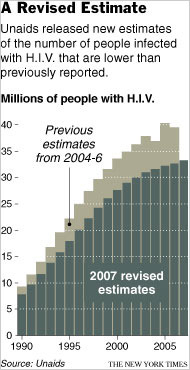 |
| Want to send this page or a link to a friend? Click on mail at the top of this window. |
| More Science & Technogy |
| Posted Thursday, November 22, 2007 |
| U.N. Agency Denies Inflating Cases of H.I.V. Deliberately |
By DONALD G. McNEIL Jr. |
After releasing new figures showing that the global AIDS epidemic is smaller than it previously reported, the United Nations’ AIDS-fighting agency denied yesterday that it had inflated estimates for years in an alarmist effort to raise funds.
 |
Officials at the agency, Unaids, were asked about the accusation — a not uncommon grumble in the heavily politicized war on AIDS — at a news conference about the revised estimates.
Dr. Paul De Lay, Unaids’s director of monitoring and policy, replied that the idea that earlier estimates were deliberately inflated was “absurd.”
The revision, disclosed in the news media on Monday night ahead of yesterday’s official announcement by the AIDS agency and the World Health Organization, puts the number of people infected with H.I.V. at 33.2 million, down from 39.5 million.
The lower figure is based on newer, more accurate surveys in India and several African countries. The costly, time-consuming household surveys made it clear that previous estimates, gleaned mainly from tests on women in urban clinics, were too high.
Dr. De Lay said that Unaids’s job was to give advice and monitor trends, and that its budget did not come from the money that has poured into the field recently to buy drugs and hunt for vaccines.
Also, he argued, “cooking this data would be almost impossible” because it is gathered by health ministries in each country and overseen by several agencies.
Dr. Kevin M. De Cock, director of H.I.V./AIDS for the World Health Organization, added that it was not clear before late 2003 that the estimates were probably too high. And the biggest drop in the global figures came from revising the figure for India downward, which was done in July.
A little-noted aspect of the revised estimate is that Unaids now assumes that someone infected with the virus and getting no antiretroviral drugs will live an average of 11 years, not 9.
The old estimate, explained Dr. Peter Ghys, chief of epidemiology for Unaids, had been based on a single study done in southern Uganda in the 1990s.
The new estimate is based on multiple studies — still unpublished but scheduled to be released soon, he said — in South Africa, Rwanda, Tanzania, Uganda, Thailand and Haiti.
Because prevalence rates are determined by surveys, he explained, the statistical effect of a higher life-expectancy average was to lower assumptions about how many people were infected each year. (It is virtually impossible to measure new H.I.V. infections in poor countries, since symptoms do not show up for years, routine testing is almost nonexistent and the virus cannot be detected even in tested people until weeks after infection.)
That data allowed Unaids to conclude that new infections had peaked between 1997 and 2001.
However, Dr. Ghys said, the shift to 11 years did not radically change the new figures on the size of the global epidemic. The longer life estimates were applied only to countries where the disease had been spreading for at least that long.
Asked if Unaids could have felt pressure to use a longer life-expectancy figure, Daniel Halperin, a Harvard AIDS researcher, said: “On the contrary, it makes their job a lot harder. They could have split the difference and gone to 10, but I think they felt they had no choice. These are the most recent, most scientifically rigorous studies.”
Copyright 2007 The New York Times Company. Reprinted from The New York Times, International, of Wednesday, November 21, 2007.
RELATED TEXTS: U.N.'s 2007 AIDS Epidemic Update / When blame is again unjustly assigned to Haitians for the pandemic, AIDS / AMHE finds results of study that assign blame to Haitians for the AIDS epidemic to be unreservly baised, to lack scientific validation
| Wehaitians.com, the scholarly journal of democracy and human rights |
| More from wehaitians.com |